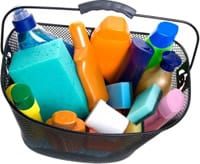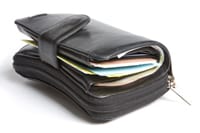 Question: Which of the following is worth more?
Question: Which of the following is worth more?
A. $100 a month pay increase.
B. Saving $90 a month by using coupons.
C. The monthly interest earned on $100.
(The answer to our trivia question is at the bottom. But first, let’s talk about your savings account.)
Do you have an emergency credit card or an emergency savings account? Using a credit card for emergencies is like kicking yourself when you’re down. Whether you need a new roof, water removed from a basement, or car repairs, you will already be spending more than your monthly budget. You don’t want to pay interest on top of that.
In 2007, Americans on average saved 1.2% of their gross wages. In these uncertain times, it is important that you have a savings account to fall back on. Experts say that your emergency savings should be equal to a minimum of eight months of income.
Do you have that much in savings just in case? If not, here are a few suggestions to get you to save more:
- Have a set amount withdrawn from your paycheck every pay period. Done automatically, you won’t even notice it is missing.
- Start using cash. When you break a paper bill, save the change by putting it into a bank or other container. You will be surprised by how much this can add up to monthly.
- Look at your spending habits and reduce or eliminate something. Pay yourself the reduced amount by putting it into your savings account. Some suggestions: bring your lunch to work or make your coffee / tea at home instead of buying it at the store.
- Just say “no.” If it cuts into your savings plan, and it’s not a life necessity, then wait. Reward yourself after your savings account is healthy.
This should boost your savings account and give you peace of mind for whatever life sends your way.
Trivia Question Answer:
B. Saving $90 a month by using coupons.
The savings you receive by using coupons are savings with after-tax dollars. Even if you are in the lowest tax bracket of 15%, a $100 raise is only worth $85 after taxes.
Using coupons is a great way to trim expenses so you can build your emergency savings account.

 Now that Spring has arrived, most of us think spring cleaning. I am going to put a twist on that for this year that will save you money, too. I want you to spring clean your finances. This is not an all day project.
Now that Spring has arrived, most of us think spring cleaning. I am going to put a twist on that for this year that will save you money, too. I want you to spring clean your finances. This is not an all day project.
 I have no idea what is going on with the weather around here. First, we start the year with a record number of snow storms and now the rain. What are we supposed to do? We need to be prepared for whatever weather comes our way.
I have no idea what is going on with the weather around here. First, we start the year with a record number of snow storms and now the rain. What are we supposed to do? We need to be prepared for whatever weather comes our way.


